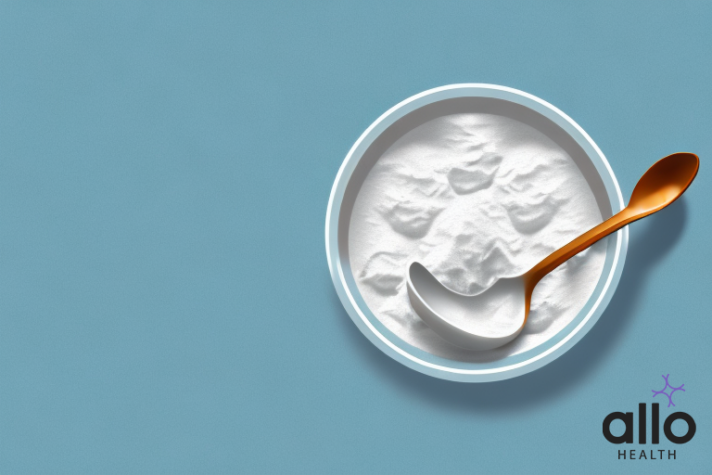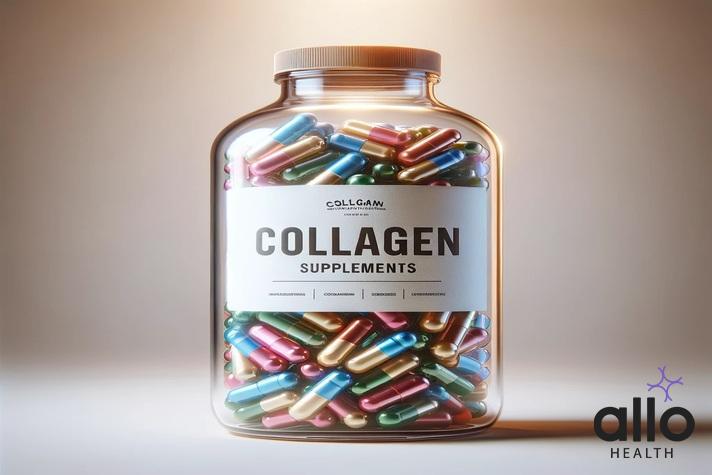Can Collagen Intake Cause Erectile Dysfunction?

"The following blog article provides general information and insights on various topics. However, it is important to note that the information presented is not intended as professional advice in any specific field or area. The content of this blog is for general educational and informational purposes only.
Book consultation
The content should not be interpreted as endorsement, recommendation, or guarantee of any product, service, or information mentioned. Readers are solely responsible for the decisions and actions they take based on the information provided in this blog. It is essential to exercise individual judgment, critical thinking, and personal responsibility when applying or implementing any information or suggestions discussed in the blog."
Erectile dysfunction is a sexual condition affecting men by causing difficulty in achieving and maintaining an erection during sexual activity. There are multiple factors that can contribute to sexual performance and it’s essential to understand these factors to find apt treatment options.
Understanding Erectile Dysfunction
Erectile dysfunction, is the inability to achieve or maintain an erection during sexual activity. It is often due to a lack of function in the cavernous tissue which is a part of the penile tissue. ED can cause significant distress and impact a person’s self-esteem and overall quality of life. There are several factors that can contribute to erectile dysfunction – including physical, psychological, hormonal and lifestyle factors.
Physical factors include conditions that affect blood flow to the penis which is affected in diseases like diabetes, and hypertension – as well as testosterone levels and nerve damage. Psychological factors, on the other hand, can include stress, anxiety, depression, and relationship issues. Lifestyle factors like smoking, alcohol use, and drug use can also contribute to erectile dysfunction.
What is Collagen?

Collagen is a natural tissue protein found in the body in connective tissues like skin, bone, and cartilage. It’s responsible for providing structure and support to these tissues, as well as promoting wound healing and skin elasticity which become the main sources of concern in collagen deficiencies. Collagen synthesis naturally decreases as we age, leading to wrinkles, joint pain, and other signs of aging.
Apart from maintaining healthy skin and joints, collagen also benefits in keeping the gut healthy. Collagen can help to strengthen the lining of the digestive tract, reducing inflammation and improving overall gut function. Additionally, collagen supplements improve muscle mass and strength in older adults, making it a valuable supplement to maintain their physical health as they age.
There are several ways to increase collagen production in the body, including consuming collagen-rich foods and incorporating collagen supplements into your diet. It’s important to note that not all collagen supplements are created equal, so it’s important to do your research and choose a high-quality product from a reputable source. With consistent use, collagen supplements can help to improve skin elasticity, reduce joint pain, and support overall health and wellness.
How is Collagen Intake related to Sexual Dysfunction
While there isn’t a direct link between collagen intake and erectile dysfunction, some researchers have hypothesized that there may be an indirect connection. Specifically, collagen is a key component of the endothelial lining of blood vessels – which helps regulate blood flow throughout the body. Some studies suggest that collagen supplementation may improve endothelial function, leading to improved blood flow and sexual health.
In addition to its potential benefits for sexual health, collagen has also been shown to have positive effects on skin health. Collagen is a major component of the skin, and as we age, our bodies produce less of it. This can lead to wrinkles, sagging skin, and other signs of aging. However, studies have shown that collagen supplementation can help improve skin elasticity and hydration, leading to a more youthful appearance.
Furthermore, collagen has been linked to improved joint health. Collagen is a major component of cartilage, which cushions and protects our joints. As we age, our bodies produce less collagen, which can lead to joint pain and stiffness. However, some studies have suggested that collagen supplementation may help improve joint function and reduce pain in people with osteoarthritis.
As mentioned in multiple instances above, collagen is found in various places in the human body and the collagen that is present is not all of the similar kind. There are various types of collagen that are present in various location in the human body and also there is a particular collagen ratio that is maintained for every tissue type.
Factors that Affect Collagen Production in the Body
Collagen production in the body can be affected by several factors – including age, dietary intake, and lifestyle choices. As we age, our bodies produce less collagen naturally. Additionally, a diet that’s lacking in key nutrients like vitamin C can impact collagen production. Finally, lifestyle factors like smoking, excessive sun exposure, and high levels of stress can all lead to decreased collagen production.
Regular exercise can also stimulate collagen production, as can using skincare products that contain collagen-boosting ingredients like retinol and peptides.
Collagen Supplements and their use
Collagen supplements come in several forms – including powders, capsules, and drinks. These supplements are designed to provide the body with additional collagen – helping to promote skin health, joint health, and more. While collagen supplements can be beneficial for some individuals, it’s important to note that they’re not a magic cure. Collagen supplements work by providing the body with additional amino acids, which can then be used to produce collagen in the body.
Collagen is a protein that is naturally produced by the body. However, as we age, our bodies produce less collagen, which can lead to wrinkles, joint pain, and other issues. Collagen supplements can help to replenish the body’s collagen levels by replenishing the depleting collagen in the human body and hence provide with the benefits of collagen, which include improved skin elasticity, reduced joint pain, and other benefits. It’s important to note that the effectiveness of collagen supplements can vary depending on the individual.
Potential Side Effects of Collagen Supplements
While collagen supplements are generally safe for most people, there are some potential side effects to be aware of. These can include digestive upset, allergic reactions, and interactions with certain medications. If you’re considering taking a collagen supplement, it’s always a good idea to talk to your healthcare provider first since there are basic adverse effects which are seen to be associated with anything new that is included into the diet or into our bodies and a clinical care provider is aware of what is to be expected in such scenarios.
It’s important to note that collagen supplements are not regulated by the FDA, so it’s important to do your research and choose a reputable brand. Additionally, while collagen supplements may have some benefits for skin and joint health, there is limited scientific evidence to support their effectiveness. It’s always best to focus on a balanced diet and healthy lifestyle habits to support overall health and wellness.
Other Factors that Affect Erectile Function
While collagen supplementation may be a useful tool in promoting sexual health, it’s important to note that there are many other factors that can be a part of the etiology of erectile dysfunction. Adopting a healthy lifestyle that’s focused on proper nutrition, regular exercise, and stress reduction can all help support sexual health and overall well-being.
In addition to lifestyle factors, certain medical conditions and medications can also affect erectile function. Conditions such as diabetes, high blood pressure, and heart disease can all contribute to erectile dysfunction. Medications used to treat these conditions, as well as antidepressants and antihistamines, can also have an impact. It’s important to speak with a healthcare provider if you are experiencing erectile dysfunction to decide an appropriate treatment of erectile dysfunction.
Natural Ways to Promote Erectile Function
There are several natural remedies that may help promote erectile function – including dietary changes, exercise, and stress reduction techniques. Eating a balanced diet that’s rich in fruits, vegetables, and whole grains can help promote cardiovascular health and improve blood flow to the penis. Exercise – particularly cardiovascular exercise – can also be beneficial for improving sexual function by promoting healthy blood flow and reducing stress. Finally, stress reduction techniques like meditation, yoga, and deep breathing may also help promote sexual health by reducing anxiety and improving overall well-being.
A basic understanding of the penile tissues and their function when explained to the patient helps them decide which natural method to choose or which to avoid since there are a plethora of options in the market in today’s times and more often than not patients are not aware of whether they are going with the correct one.
Balancing Collagen Intake with Other Nutrients
While collagen supplements may be useful for some individuals, it’s important to remember that they’re not a replacement for a healthy, balanced diet. To promote optimal health and well-being, it’s essential to eat a diet that’s rich in a variety of nutrients – including protein, healthy fats, vitamins, and minerals. Additionally, it’s important to work with a doctor to determine the best course of action for your specific needs and medical history.
However, it’s important to note that the body’s ability to produce collagen naturally decreases with age, so incorporating collagen supplements into your diet may be beneficial for maintaining healthy skin, joints, and bones. It’s also important to stay hydrated, as dehydration can lead to decreased collagen production and dry skin. By combining a balanced diet with collagen supplements and proper hydration, you can support your body’s natural collagen production and promote overall health and wellness.
When to Seek Medical Attention for Erectile Dysfunction
If you’re experiencing difficulty achieving or maintaining an erection, it’s important to talk to your healthcare provider. Erectile dysfunction can be a symptom of an underlying health condition, so it’s important to identify and treat the root cause of the problem. Your healthcare provider can help determine the best course of action for your specific needs – which may include lifestyle changes, medication, or other therapies.
It’s also important to seek medical attention if you experience sudden or severe erectile dysfunction, as this could be a sign of a more serious health issue such as heart disease or diabetes. Additionally, if you have a history of prostate cancer or surgery, it’s important to discuss any changes in erectile function with your healthcare provider. Don’t be embarrassed to bring up the topic – your healthcare provider is there to help you and can provide valuable guidance and support.
Final Thoughts: Can Collagen Intake Cause Erectile Dysfunction?
While there isn’t currently enough evidence to definitively link collagen intake and erectile dysfunction, some studies suggest that collagen supplementation may be beneficial for improving sexual function by promoting healthy blood flow and endothelial function. However, it’s important to remember that there are many factors that can impact erectile function.
It’s also worth noting that collagen supplements are generally considered safe for most people when taken as directed. However, if you have a history of allergies or are taking any medications, it’s important to speak with your doctor before starting any new supplement regimen.
Additionally, it’s important to choose a high-quality collagen supplement from a reputable source to ensure that you’re getting a product that is free from contaminants and has been properly tested for purity and potency.
Most Asked Questions
-
Are all antihistamines linked to erectile dysfunction?
No, not all antihistamines are linked to erectile dysfunction. Some, like desloratadine and loratadine, have shown potential benefits in improving sexual function. The impact depends on the specific type of antihistamine and its receptor activity.
-
Are herbal remedies a reliable solution for erectile dysfunction?
While some herbal supplements may help, their effectiveness varies, and it’s important to use them cautiously. Always consult with a medical professional before trying herbal remedies.
-
Are there alternative treatments for Erectile Dysfunction (ED)?
Depending on the cause, erectile dysfunction can be cured. Some causes of Erectile Dysfunction (ED) are easier to cure than others. A medical or psychological evaluation may be necessary to reach the right diagnosis and treatment. Medications may also be prescribed along with psychological intervention.
-
Are there alternatives to medication for managing low serotonin and erectile dysfunction?
Yes, there are alternatives. You can consult with your doctor about non-pharmaceutical options, like therapy or lifestyle changes, to help manage low serotonin levels and improve sexual health.
-
Are there any approved topical treatments for erectile dysfunction?
Currently, there are no FDA-approved topical treatments specifically designed to address erectile dysfunction. Medical interventions for ED usually include oral medications, injections, or other treatments prescribed by a doctor based on the person's specific health needs.







































